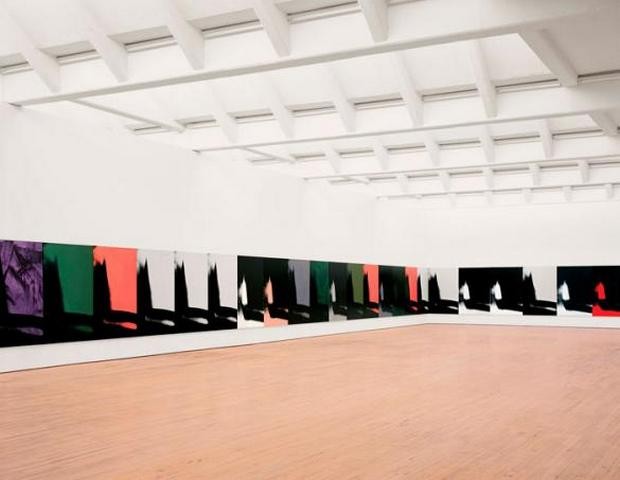Andy Warhol
Shadows
26 Feb - 02 Oct 2016

Installation view, Andy Warhol, Shadows, 1978–79
Acrylic on canvas, 102 paintings on canvas (all unframed) 193 × 132 × 2,9 cm each
Acrylic on canvas, 102 paintings on canvas (all unframed) 193 × 132 × 2,9 cm each
ANDY WARHOL
Shadows
26 February – 2 October 2016
Andy Warhol, the chronicler of an era, was known for admitting his “fondness for dull things,” which by the early 1960s corresponded to his use of photographic reproductions of found imagery culled from newspapers, magazines, and image archives. In 1978, at age 50, Warhol embarked upon the production of a monumental body of work titled Shadows with the assistance of his entourage at the Factory. These 102 silkscreened canvas panels formalized earlier explorations with abstraction. To locate the radical implications of Warhol’s Shadows, one must begin with the work’s form: this series was conceived as one painting in multiple parts, the final number of canvases determined by the dimensions of an exhibition space. In the first exhibition 83 canvases were installed edge to edge, a foot from the floor, in the order that Warhol’s assistants hung them.
The 102 canvases, all of them on view at the Guggenheim Museum Bilbao, show Warhol’s signature palette of bright hues with cheerful excess. The backgrounds of these canvases were painted with a sponge mop, the streaks and trails left by the mop adding “gesture” to the picture plane. Seven or eight different screens were used to create Shadows, as evidenced in the slight shifts in scales of dark areas as well as the arbitrary presence of spots of light. The “shadows” alternate between positive and negative imprints as they march along the wall of the gallery.
Despite the apparent embrace of repetition, Warhol’s “machine method” is nothing but handmade. A significant and intriguing fact about Shadows is the irreproducibility of its assumed reproduction, a point that problematizes his infamous aesthetic of “plagiarism” and positions Warhol’s project as one that is primordially pictorial. Far from replicas, each Shadow corresponds to a form that reveals, with precision and self-awareness, its space, directing the viewer’s gaze to light, the central subject of the series. In focusing on the shadow to devise light—that is to say, sparks of color—Warhol returns to the quintessential problem of art: perception.
Andy Warhol: Shadows is organized by Dia Art Foundation
Shadows
26 February – 2 October 2016
Andy Warhol, the chronicler of an era, was known for admitting his “fondness for dull things,” which by the early 1960s corresponded to his use of photographic reproductions of found imagery culled from newspapers, magazines, and image archives. In 1978, at age 50, Warhol embarked upon the production of a monumental body of work titled Shadows with the assistance of his entourage at the Factory. These 102 silkscreened canvas panels formalized earlier explorations with abstraction. To locate the radical implications of Warhol’s Shadows, one must begin with the work’s form: this series was conceived as one painting in multiple parts, the final number of canvases determined by the dimensions of an exhibition space. In the first exhibition 83 canvases were installed edge to edge, a foot from the floor, in the order that Warhol’s assistants hung them.
The 102 canvases, all of them on view at the Guggenheim Museum Bilbao, show Warhol’s signature palette of bright hues with cheerful excess. The backgrounds of these canvases were painted with a sponge mop, the streaks and trails left by the mop adding “gesture” to the picture plane. Seven or eight different screens were used to create Shadows, as evidenced in the slight shifts in scales of dark areas as well as the arbitrary presence of spots of light. The “shadows” alternate between positive and negative imprints as they march along the wall of the gallery.
Despite the apparent embrace of repetition, Warhol’s “machine method” is nothing but handmade. A significant and intriguing fact about Shadows is the irreproducibility of its assumed reproduction, a point that problematizes his infamous aesthetic of “plagiarism” and positions Warhol’s project as one that is primordially pictorial. Far from replicas, each Shadow corresponds to a form that reveals, with precision and self-awareness, its space, directing the viewer’s gaze to light, the central subject of the series. In focusing on the shadow to devise light—that is to say, sparks of color—Warhol returns to the quintessential problem of art: perception.
Andy Warhol: Shadows is organized by Dia Art Foundation
